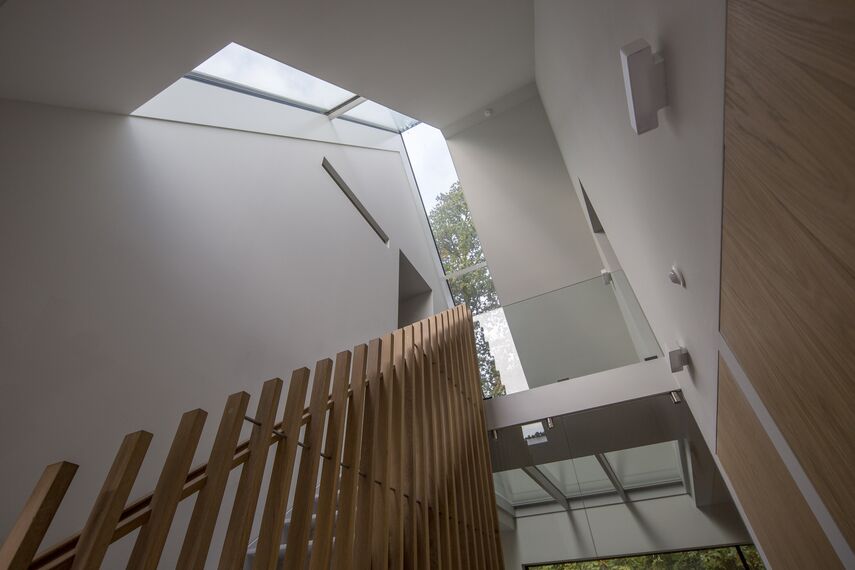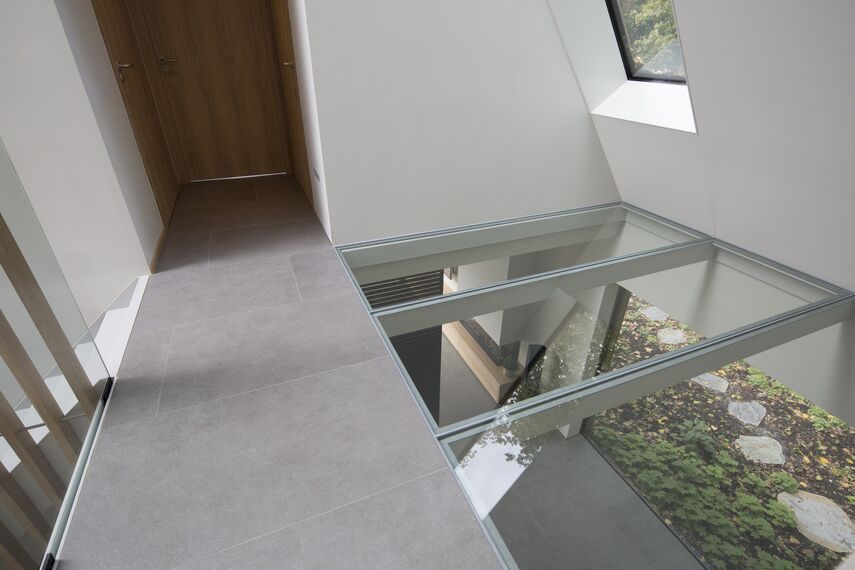Bosvilla Voorschoten
Modern woodland villa on country estate in Voorschoten
On the Duivenvoorde Estate , work on the new Haagwijk Country Estate is well underway. A modern woodland villa, designed by Tijmen Versluis of architect eigen huis , is the first house in Haagwijk to be completed. Sophisticated detailing gives this archetypal house a very modern look. Stunning woodland and meadow views and a preference for minimalism by both the architect and clients defined the clean-lined design.

The villa is situated in a rural area on the country estate of Duivenvoorde Castle.
Haagwijk
Situated in the middle of the Duivenvoorde corridor, a rural area between Leidschendam and Voorschoten, is Haagwijk. Haagwijk takes its name from a former country estate that was demolished in the 18th century and incorporated into the country estate of Duivenvoorde Castle . Under the ‘grass for glass’ regulation, planning permission was granted for the construction of eight detached villas and an apartment complex in Haagwijk to compensate for the demolition of greenhouses. The landscape design for Haagwijk is by Delva Landscape Architects and Michael van Gessel.
Archetypal house
The first house in Haagwijk to be completed is this woodland villa. It is an archetypal house: a rectangular ground floor and a first floor with a high saddle roof. External walls and roof blend into each other and are finished entirely with NobelWood cladding. Architect Tijmen Versluis explains his choice: ‘NobelWood is bio-modified pine, which ages beautifully evenly to a silvery grey colour.’
NobelWood is bio-modified pine, which ages beautifully evenly to a silvery grey colour.
Roof and external walls have a very straight- and clean-lined design. Windows, gutters and chimneys all lie within the roof and wall planes. Semi-transparent projections give the end walls a refined look. Large aluminium windows intensify the contact between the inside and outside world.

The house is very close to the woods.
Orientation determined by the environment
The position and orientation of the house were determined by the woods and views. ‘The house sits in the northwest corner of the plot, very close to the woods. The orientation of the rooms in the house is such that every room gives you a different experience of the environment,’ Versluis explains.
On the side of the access road to the residential area, the living room has a large sliding window leading onto a terrace and a large lawn. The minimalist three-panel sliding window can be opened automatically. The bedroom above it has folding doors in this wall, which give out onto a balcony. The entrance section is situated in the southeast wall on the side of the drive. A glass door and a floor-to-ceiling window next to it flood the entrance hall with light. Apart from this, it is a closed wall.
Situated on the northeast side is the dining area overlooking meadows and farmlands. The wall opens out onto the adjoining veranda via sliding windows. The veranda roof has movable slats, which can be closed to form a waterproof roof. The woods on the northwest side of the house can be enjoyed to the full from the entrance hall and the kitchen through an 8.5 by 2.4 m panoramic window.
In the video below, architect Tijmen Versluis of architect eigen huis talks about his design of the woodland villa.
Sight lines and views
A long sight line runs lengthwise through the house; through the living room, kitchen and dining room. This continuous space can be divided into three areas through semi-transparent panels.
A second sight line runs diagonally through the house from the entrance, to the back and upwards. At the top of the stairs in the entrance hall with vide (open space), there is a glass strip in the roof. A glass floor allows natural light to also enter the kitchen through the roof.

The minimalist design and concealed installations create an integrated whole.
Minimalism down to the smallest detail
To maintain the clean-lined look of the house, architect Versluis designed everything in great detail. Installations have been concealed in openings behind the wooden wall cladding. Versluis had a special stainless steel box with stainless steel perforated slats designed for the flues of the two gas fires. Rainwater from the roof is collected in built-in gutters.
As part of the security system, narrow flash lights have been fitted between the wooden panels on the end wall as security lighting. These small lights were originally developed for use in car grilles. The glass door leading to the bike shed is also near invisible because it has been finished with identical wooden panels. Even the hinges of this door have been built into the wall.
Window profiles
The aluminium windows have also been largely concealed behind the wood. Versluis on his choice of windows: ‘We chose aluminium windows because it is a low-maintenance material. With the profiles by Reynaers, we were able to have all the windows made that we wanted to fit in this house: curtain wall profiles for the large window on the side of the woods, a curtain wall profile on wood for the light strip in the roof plane, minimalist sliding windows for the terraces and ordinary standard front-door windows. This way, we managed to do them all in just one material.’
I loved that we were able to apply a very beautiful coating to the aluminium profiles, which gives the windows a mat and stylish look.
On the finish of the windows, the architect says: ‘I loved that we were able to apply a very beautiful coating to the aluminium profiles, which gives the windows a mat and stylish look.’ Wall construction company Boeters Alubo expertly assembled the windows and fitted them into the walls.

The solar panels are not on the roof, but along the drive.
Sustainable
The woodland villa is well insulated and equipped with an air/water heat pump for heating and cooling. Twenty-eight solar panels generate the required energy. Obviously, the solar panels weren’t allowed to be installed on the carefully detailed roof structure. Instead, they are positioned along the drive.
Sistemas Reynaers utilizados
Colaboradores participantes
Elaborador
- Boeters Alubo














